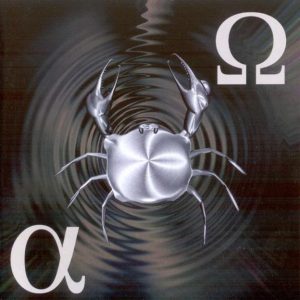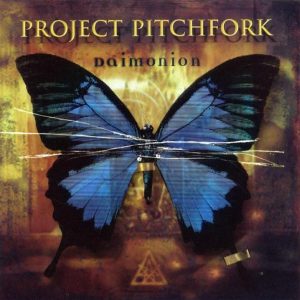The Anthem Era
Project Pitchfork now formed their own label (Candyland Entertainment), with the first release being the six-track EP Corps d’Amour. It’s an oddity in the band’s catalogue due to the very ‘personal’ nature of the lyrics, the best explanation being that this was a recording to allow Peter Spilles to get closure on his now-finished relationship with Patricia Nigiani. The songs aren’t exceptionally notable with the exception of the touching title track, but it was the dawn of a new era of the band nonetheless.
The real statement of intent came with Alpha Omega. The Pitchfork sound and presentation style is cleaned up, their songs become more accessible, but none of their distinctive style is lost. The title track is as good as any – a song with not one but two social statements, the ‘boiling frog’ analogy converted to crayfish but otherwise highlighting the best and worst the human race can do. The club hit here was Requiem, the crystal synth lead and marching beat instantly forging a dark dance classic. The most complicated track on the album musically is Revolution Now, though the underlying ‘do something!’ message is clear even to the casual listener. You may fall for any of the others, but a personal favorite here is Silent Scream, highlighting the dangers of religious zeal spilling over into the real world.
Singles and Versions: No ‘Little’ bonus disc this time, but CH’I – a seven-track remix EP that nearly made it into the main text, though as it’s mainly remixes of the album tracks, a side note is all it gets. The mixes are varied in quality, some being self-consciously ‘noisy’ to the point of being grating. Two new tracks – Lengé is a pleasant but not-essential instrumental, and The Liar is an all-over-the-place frenzy that samples Aphex Twin and flies off in every direction from there.
They didn’t sit still after this. Jurgen Jansen joined the line-up and with him on board, 1997 saw the arrival of ‘!Chakra:Red!’. More guitars than before and a hint of the then on-trend breakbeats, but still a pure Pitchfork album at the core. Human Crossing harks back to ‘Box of Steel’ and Rat 41 on “Dhyani”, a striking anti-animal testing anthem updated to late 90s standards. Always been a personal favourite, though the out-and-out anthem is God Wrote, that massive bassline and apocalyptic theme a setlist regular to this day.
2069 AD is another dystopia, built on a wild break and thrashy riff that amounts to the most guitar-heavy track they’ve delivered to date. The bands more reflective side is featured to great effect on December Sadness, whilst I’ll Find My Way Home is a rare cover version, a wave to one of their less obvious influences (does anyone else remember Jon & Vangelis?). But as a complete piece, this album works as well as anything they’ve released before of since. There’s just more interesting things going on here than anywhere else.
Singles and Versions: No real offshoots, but a stand-alone single was released shortly before called En Garde!. Some versions of the album get this as a bonus track and the band seem to like playing it live a lot, but I’ve never sussed the appeal of this one – they were right to leave it off the official version for sure.
A move to major label EastWest came in 1988, with Eon:Eon continuing the diversity of the previous album. It’s not such a smooth ride – their use of the cluttered Rescue as a set closer has always confused me (especially since they dropped the live guitar), and there’s too much monotonous filler. But the good far outweighs the bad – I Live Your Dream is the perfect pop song in Pitchfork form, a simple piano-led tune but one that does better without the complex embellishments Spilles and co are known to pile on.
Karma Monster is a slow burner, the bands love of metaphysical themes sitting neatly with the subtle musical accompaniment, whilst Orange Moon is a structurally-complex affair that goes through several phases in order to deliver it’s message. Of course, if you’re just looking for the anthem, they’re at either end of the album – Carnival is as close as you’ll get to ‘classic’ Pitchfork here, and Steelrose takes the then-emerging harsh EBM brigade on at their own game. Less obvious but still worth a listen is Hunted – a call-response dynamic reminiscent of 242 at their best.
Singles and Versions: Little Eon:Eon doesn’t have anything you can’t get elsewhere, but there’s three singles this time – Carnival, Steelrose and I Live Your Dream all excellent choices for single treatment. The B-side exclusive tracks are at least interesting, but there’s also some really high profile remixes – Front 242, Die Krupps and Gary Numan are all namechecked, but the real gem is Apoptygma Berzerk’s take on ‘Steelrose’, giving it the proto-futurepop trance breakdown for those that love to put their hands in the air.
Onto 2001 – futurepop in the ascendancy, and Project Pitchfork in danger of sounding like last seasons fashion. Daimonion was their response, and it remains one of their most accessible albums of all. You probably already know Timekiller – that huge synth lead, a jagged guitar riff to underpin the rhythm and let Spilles handle the rest. Existence is the other obvious anthem (this being last time this band would release multiple ‘singles’ to let you know which tracks were meant to be the stand-outs), the nearest they ever got to industrial metal, and the whole “truth is being kept from us” theme fits their mission statement well.
Whilst the album has its share of turgid noodling, there’s still plenty of other highlights. The song pairing of Drone Assembly and Drone State are best enjoyed back-to-back, an extended intro leading into the marching beat that defines the song’s theme as how humanity lives it’s daily life so mindlessly. Mine – Beast Of Prey is a two-sided beast that paints a very graphic portrait of the danger of unexploded munitions. If you’re a fan of Pitchfork’s more subtle side, Fear sees vocoded lyrics describing a surprisingly affirming statement about handling aggressors. I could also wax lyrical about the bagpipe-like synth that leads the title track or maybe even We Are One, but I’m running out of space and fresh ways to say “this is good”.
Singles and Versions: Timekiller gets a plethora of remixes, including a NIN-esque Phillip Boa take, a love-or-hate And One mix that’s really a cover version and an unexpectedly poppy radio edit that’s nothing like the original. Existence needlessly reprises a couple of tracks from the album, but we also get a then in ascendancy VNV Nation do their dark-bassline-and-flying-strings thing, and hence give DJs with a guitar aversion a way of playing this track.







